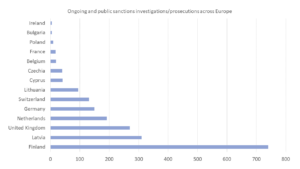The Dutch Public Prosecution Service has issued a press release relating to a settlement with the company Dieseko Group BV for its role in supplying equipment and expertise for the construction of the Kerch bridge in breach of the EU’s sanctions in relation to Crimea.
The prohibited activities took place during 2015 to 2016 and were uncovered through press reporting in 2017. An investigation was commenced in 2017 (see our earlier post) and then expanded to include Dieseko (see our earlier post).
The company exported equipment and machinery (via Finland but with the knowledge that the goods were to go to Crimea) and supplied staff to the site to provide technical assistance.
The company was given the maximum available fine per each of the three counts with a discount for its cooperation with the investigation for a fine of €180,000. The cooperation includes document production and making staff available for interview.
The company has also had its entire “gain” from its work on the bridge confiscated of €1.6m. It is not entirely clear if this is gross or net profits.
The company has put in place remediation and compliance measures. The senior management of the company were interviewed as part of the investigation but will not be prosecuted as two have since passed away and one is seriously ill.
For the Statement of Facts see here.
For the Settlement Agreement see here (in Dutch).
The Dutch version of the Press Release includes comment that the Dutch intend to prosecute another company and several individuals for their involvement in the building of the Kerch bridge.

